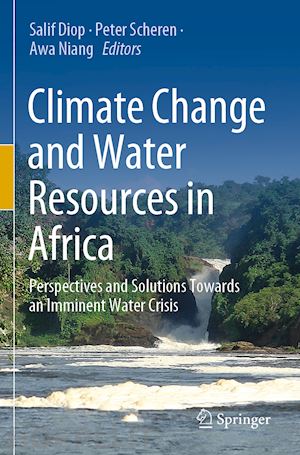
Questo prodotto usufruisce delle SPEDIZIONI GRATIS
selezionando l'opzione Corriere Veloce in fase di ordine.
Pagabile anche con Carta della cultura giovani e del merito, 18App Bonus Cultura e Carta del Docente
The focus of this book is on the key water-related vulnerabilities to climate change in Africa, particularly in its most vulnerable areas, exploring potential management responses to such vulnerabilities.
The African countries are particularly exposed and vulnerable to the negative impacts of climate change, with important impacts on water resources and hydrological systems, water availability, water resource management and sea level variations. Already, under various anthropogenic pressures, the status of water resources in Africa has been changing over the past decades, with decreasing water quality, falling groundwater levels, and variability in rainfall, both in terms of timing and intensity. Climate change will further accelerate the rate of change, affecting the ability of people and societies to respond in a timely manner.
It is clear that there is no quick fix to the pressures imposed on water resources by climate change. Increasing the resilience of ecosystems and communities to extreme events such as flooding and drought, and integrating climate change risks and opportunities into development decision-making is indeed a key challenge, as much a technical climate-change one, as a political and developmental challenge.
The book, in this regard, intends to contribute to the debate around climate change in relation to water resources management in Africa, and in particular inform policy decisions and actions that will improve governments’ and communities’ ability to manage the challenges of climate change and variability in relation to the aquatic ecosystems that they depend on. The knowledge collected in this book will benefit policy makers, researchers, as well as other stakeholders.
Dr. Peter Scheren has been engaged in research, assessment and management of both freshwater and marine ecosystems across Africa for over 25 years, in various parts of the continent. His passion is to bring the science, knowledge and capacity for understanding of such systems together to guide policy, strategy and governance systems that will help safeguard the ecosystem functions and values that strengthen the nature and the people that depend on them. He is the author and editor of many publications in this field. Peter Scheren holds a PhD from the University of Eindhoven and the University of Wageningen in the Netherlands, with a focus on Integrated Environmental Assessment of Water Systems. He has worked for various research institutions, consultancy offices and international organizations, and has managed several large-scale freshwater and marine programs in Africa for WWF, UN Environment, UNIDO and UNDP. He is currently active as a freelance consultant, based in France, supporting the development of a range of strategic, transformational projects and programs for WWF in their various fields of work across Africa.
Dr. Awa Niang is an Associate Professor of Continental Hydrology at Cheikh Anta Diop University, in Dakar, Senegal. She holds a First doctoral thesis from Cheikh Anta Diop University, with a focus on water quality management of Guiers Lake (Senegal River Delta). In 2014, she also earned a PhD on recent hydrological and morphological changes in the Senegal River Estuary. Her recent work focuses on vulnerability and resilience of the coastal social-ecosystems of the Senegal River Estuary. She participates in various projects and programs dealing with Integrated Water Resource Management, remote sensing applied to water resources and environmental management, and coastal and estuarine studies. She contributes to the design, implementation and management of the Doctorate School on Water Quality and Uses that oversees NEPAD’s West African network of Centers of Excellence on Water Sciences and Technologies. She leads the scientific Secretariat and communications of the doctoral school since its creation in 2008. She is now coordinating doctoral studies on continental hydrology and integrated water resource management. In the academic year 2018-2019, A. Niang was appointed as technical adviser to the Ministry of Research, Higher Education and Innovation of Senegal, in charge of Academic Affairs.











Il sito utilizza cookie ed altri strumenti di tracciamento che raccolgono informazioni dal dispositivo dell’utente. Oltre ai cookie tecnici ed analitici aggregati, strettamente necessari per il funzionamento di questo sito web, previo consenso dell’utente possono essere installati cookie di profilazione e marketing e cookie dei social media. Cliccando su “Accetto tutti i cookie” saranno attivate tutte le categorie di cookie. Per accettare solo deterninate categorie di cookie, cliccare invece su “Impostazioni cookie”. Chiudendo il banner o continuando a navigare saranno installati solo cookie tecnici. Per maggiori dettagli, consultare la Cookie Policy.